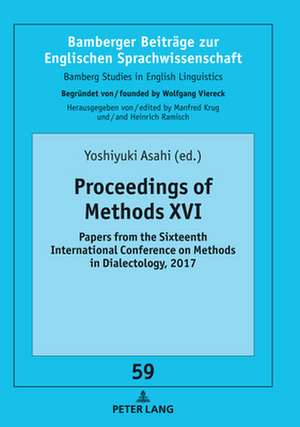Proceedings of Methods XVI: Bamberger Beitraege zur Englischen Sprachwissenschaft / Bamberg Studies in English Linguistics
en Limba Engleză Hardback – 29 apr 2020
Preț: 481.45 lei
Preț vechi: 594.37 lei
-19% Nou
92.15€ • 100.13$ • 77.46£
Carte tipărită la comandă
Livrare economică 22 aprilie-06 mai
Specificații
ISBN-10: 3631801157
Pagini: 300
Dimensiuni: 148 x 210 x 24 mm
Greutate: 0.54 kg
Editura: Peter Lang Copyright AG
Seria Bamberger Beitraege zur Englischen Sprachwissenschaft / Bamberg Studies in English Linguistics
Notă biografică
Cuprins
Katharina Pabst, Lex Konnelly, Melanie Rothlisberger, and Sali A. Tagliamonte: Individual- vs. community-level variation: New evidence from variable (t,d) in Canadian English ¿ Akiko Okumura: Variation and change in a Japanese new town: Production and perception of variable (ng) ¿ Hajime Oshima: Innovative possessive marker in the Burgenland dialect of Hungarian in Austria ¿ Chingduang Yurayong: Postposed demonstrative: An innovation from contact between North Russian and Central Veps dialects ¿ Jos Swanenberg: Does dialect loss give more or less variation?: On dialect leveling and language creativity ¿ Kazuko Matsumoto: Nativisation in adolescent Palauan English: A discourse-pragmatic perspective ¿ Rika Ito: But I'm embarrassed!: The representation of Hokkaido dialect in the Japanese anime, Silver Spoon ¿ Keiko Hirano and David Britain: Accommodation and social networks: Grammatical variation among expatriate English speakers in Japan ¿ Heike Wiese: Language situations: A method for capturing variation within speakers' repertoires ¿ Kevin Heffernan: The diffusion of lexical bundles from an urban center to a rural community in Japan ¿ Harumi Mitsui, Kanetaka Yarimizu, and Motoei Sawaki: The structure of diversified language usage in metropolitan Tokyo: Analyses using large-scale database for word accent ¿ Mihoko Kubota: Different paths in the acquisition of Japanese negative words meaning prohibition: Dame in the standard form and akan in the western dialect ¿ Kazuko Tanabe: Analysis of the transmission of reference honorifics in the Japanese household ¿ Salvatore Carlino: The state of dialect usage and transmission in Iheya ¿ Marjatta Palander: Change in spoken Finnish: The dialect of 7-year-olds of two generations ¿ Brian Jose: A real-time perspective on the Southern vowel shift in Kentuckiana ¿ Nobuko Kibe, Kumiko Sato, Taro Nakanishi, and Kohei Nakazawa: Corpus-based study of Japanese dialects: Regional differences in accusative case marking system ¿ Hitoshi Nikaido: The speaking style of elderly assembly members in the Fukuoka prefectural assembly ¿ Kenjiro Matsuda: The birth and diffusion of group languages in the National Diet ¿ Suguru Kawase: Regional differences in conjunctives in the minutes of local assemblies ¿ Stephen Levey and Heike Pichler: Revisiting transatlantic relatives: Evidence from British and Canadian English ¿ Martin Schweinberger: Using semantic vector space models to investigate lexical replacement: A corpus-based study of ongoing changes in intensifier use ¿ Chihkai Lin: Pazeh-Kaxabu affinity revisited: from a corpus-based approach ¿ Yuji Kawaguchi: Standardization and distance: A case study of the linguistic atlas of Champagne and Brie (ALCB) ¿ Jung-min Li and Hsiao-feng Cheng: A geolinguistic study on Taiwanese in the west coast of Taiwan using 'Glottograms' ¿ Hiroyuki Suzuki and Lozong Lhamo: 'Where' as a negative prefix in Khams Tibetan: A geolinguistic approach towards a grammaticalisation process

